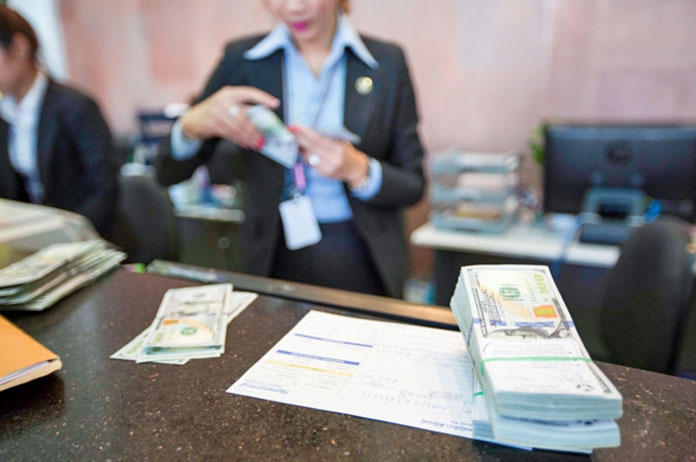Central Bank To Carry Out On-site MFI Audits
 A staff member counts out money on a counter of an MFI office in Phnom Penh. Cambodia Microfinance Association president Hout Ieng Tong claims that all their members have already complied with the 18% PA interest rate cap.
Cambodia’s central bank is to conduct on-site audits of microfinance institutions to check if they are complying with the interest rate cap that came into force more than two months ago, industry insiders have said.
A staff member counts out money on a counter of an MFI office in Phnom Penh. Cambodia Microfinance Association president Hout Ieng Tong claims that all their members have already complied with the 18% PA interest rate cap.
Cambodia’s central bank is to conduct on-site audits of microfinance institutions to check if they are complying with the interest rate cap that came into force more than two months ago, industry insiders have said.
The National Bank of Cambodia set the interest rate cap of 18 percent per annum for microfinance institutions, deposit-taking MFIs and licensed rural credit institutions in mid-March. It came into force on April 1.
The cap was intended to back government policy that helps the poor, curbs indebtedness and alleviates poverty, as well as protects customers from being charged high interest rates from financial institutions. The interest rate cap also encourages MFIs to exercise caution when making out loans to its clients.
Bun Mony, chairman of the board of Vithey Microfinance, said all licensed institutions have already complied with the directive. “I don’t believe there are any institutions that aren’t complying with the cap, because they know the NBC will have their team conducting audits of loan paperwork,” said Mony. “I recently talked with the NBC, who told us their technical team would conduct on-site audits after the results of the commune elections.”
Hout Ieng Tong, president of the Cambodia Microfinance Association and general manager of Hattha Kaksekar, said all his members have already complied with the cap and are operating as normal. “As an operator, we have to pay respect to what the regulator requires. We don’t think that it is an issue because our interest rates had been dropping already,” he said. “Of course, I don’t deny there is an impact on our revenue, but it is just a small impact and we will survive. I think it is harder for the small institutions.”
Stephen Higgins, the managing partner of research firm Mekong Strategic Partners, told Khmer Times previously that interest rate caps are poor public policy and hurt the poor the most. He said it either restricts their access to finance or pushes them into the hands of loan sharks who charge much higher rates.
“At 18 percent, the industry simply wouldn’t be sustainable, and what has been a real success story for Cambodia will end up being a cautionary tale in the way that the MFI crisis in Andhra Pradesh was for the MFI sector in India," said Higgins. "From a macro perspective, it’s also going to hurt Cambodia as the MFI sector has pushed a lot of cash into Cambodia’s rural sector in recent years, and that will now reverse.”
According to Mony, the sector has been playing a critical role in poverty reduction in rural areas. “We always follow our code of conduct to help the poor, but unlicensed rural creditors charge high rates to customers,” he said. “Our sector has been gradually reducing interest rates for a long time, due to newcomers and competition in the market, but we did it silently. That’s why the public doesn’t know.”